



The President of the Autonomous Province of Bolzano Arno Kompatscher opens Sustainability Days 2022.
Johannes Hahn, European Commissioner for Budget and Administration, and Enrico Giovannini, Minister for Infrastructure and Sustainable Mobility
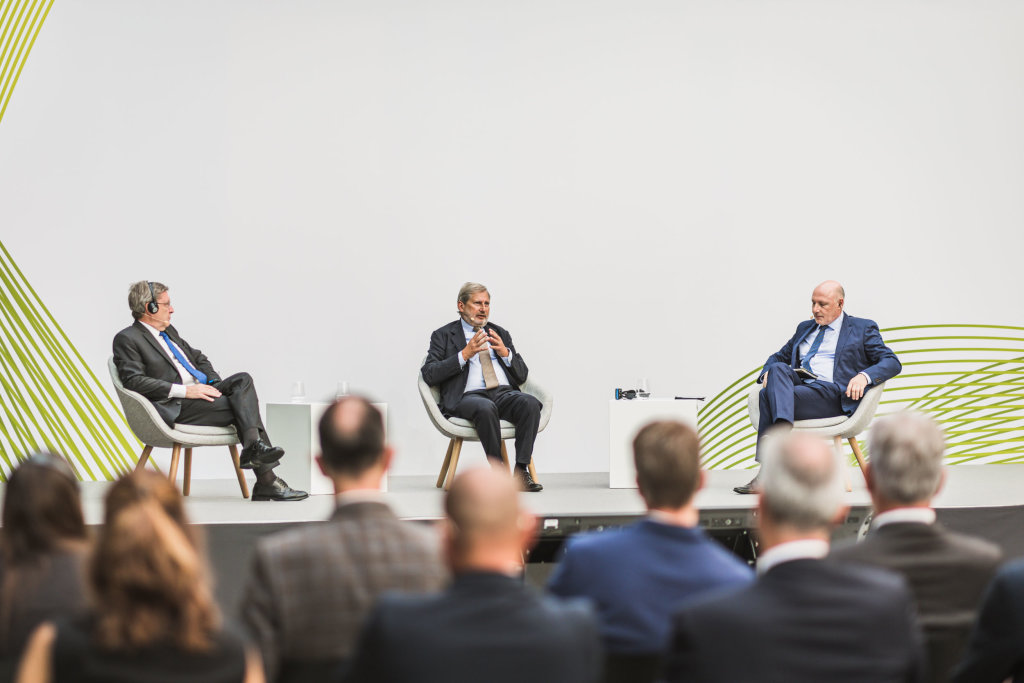
How will we face the coming winter? Is the European Union facing significant challenges that could even block planned programs?
Hahn: No, exactly, the opposite must happen. The summer just ended and has shown us how dependent we are on climate and resources. We must also strive for strategic energy independence. We must strive to diversify our suppliers. We have recognized the importance of Europe's cohesion in the green turnaround, which is a priority for all of us.
Putin has cut off gas supplies. European politicians are independently trying to find alternatives. Is there any cohesion here at all?
Hahn: The task of a responsible politician is to strike a balance between immediate problem-solving and long-term planning. We are in a transition process that will not happen overnight, but by diversifying our energy suppliers, we are less dependent on the political decisions of individuals.
Will the planned projects go ahead despite the upcoming change of government? Conversely, should we expect interruptions in projects already underway?
Giovannini: We know that the right-wing has a less positive attitude toward "sustainability." However, when I studied the election programs, I found there is a will to continue the vision for which we strive. For example, I see differences in urban development and urban mobility. However, I hope that compromises will be found here.
How does Brussels see future changes in the Italian government?
Hahn: We are following political developments in Italy very closely. Italy is a progressive and ambitious country. No matter which government is in power, it must stick to the agreements it has made to continue to secure European funds for the green turnaround.
Is the constant growth of the economy an obstacle to the goals set? How can we reconcile economic development with ecological intentions?
Hahn: We need to distinguish between quantitative and qualitative growth. We need to move toward the latter. We should strive to ensure that our standard of living remains secure in the future. In some areas, we should set new guidelines and goals.
President of the UN Global Compact Network Italy, lecturer at the Sant'Anna School for Advanced and University Studies in Pisa and member of the advisory board of Sustainability Days 2022.
We have been familiar with the term "sustainable development" since 1987. It defines development that meets the needs of the present without depriving future generations of the opportunity to meet their own needs. The concept is based on three pillars: economic, social and environmental. This definition is still very relevant today, and the challenge of sustainability is precisely that we manage to integrate these three variables into our vision of the future.
We must maintain stable economic growth, create serious social engagement among citizens, and benefit from an ecosystem that can increase our resources. These are the assets we must preserve for future generations. Currently, these three factors are very different in different countries worldwide.
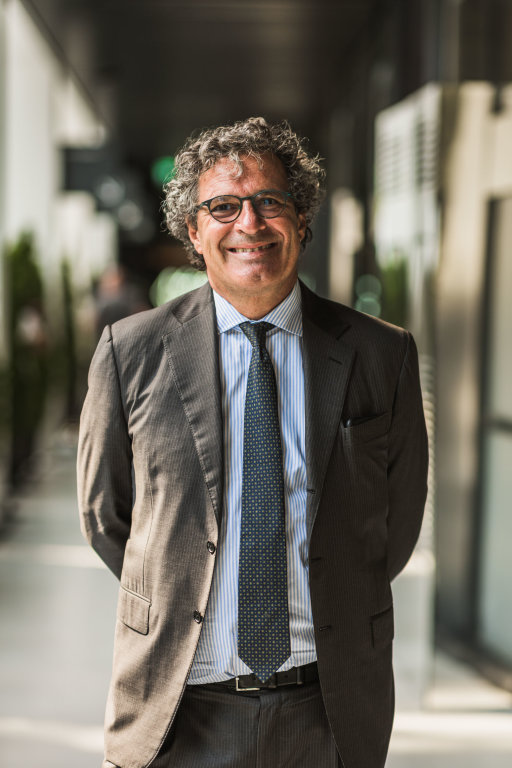
As far as we are concerned, we must reduce our carbon footprint, and the only way to do this is to change our economic model. We need policies that lead to concrete actions. Some examples? Decarbonization, circular economy, more efficient use of resources, energy transition, mobility and food, sustainable mobility and zero pollution, efforts to combat climate change and use of new technologies.
Robert Engle, Professor Emeritus of Finance at New York University Stern School of Business (NYU Stern), won the 2003 Nobel Memorial Prize in Economic Sciences for his research on the concept of autoregressive dependent heteroscedasticity.
Nobel laureate in economics, university professor and confessed lover of South Tyrol: for American Robert Fry Engle, it is clear that rural areas must and can face the physical risks of climate change. For example, according to him, rural areas will likely have more opportunities to rely on alternative energy sources, such as solar energy, wind or hydropower. Also, the likely cost of mitigation measures will be lower for rural areas. He sees great potential in synergy, with rural regions joining together, benefiting from each other's insights, and thus becoming more influential.
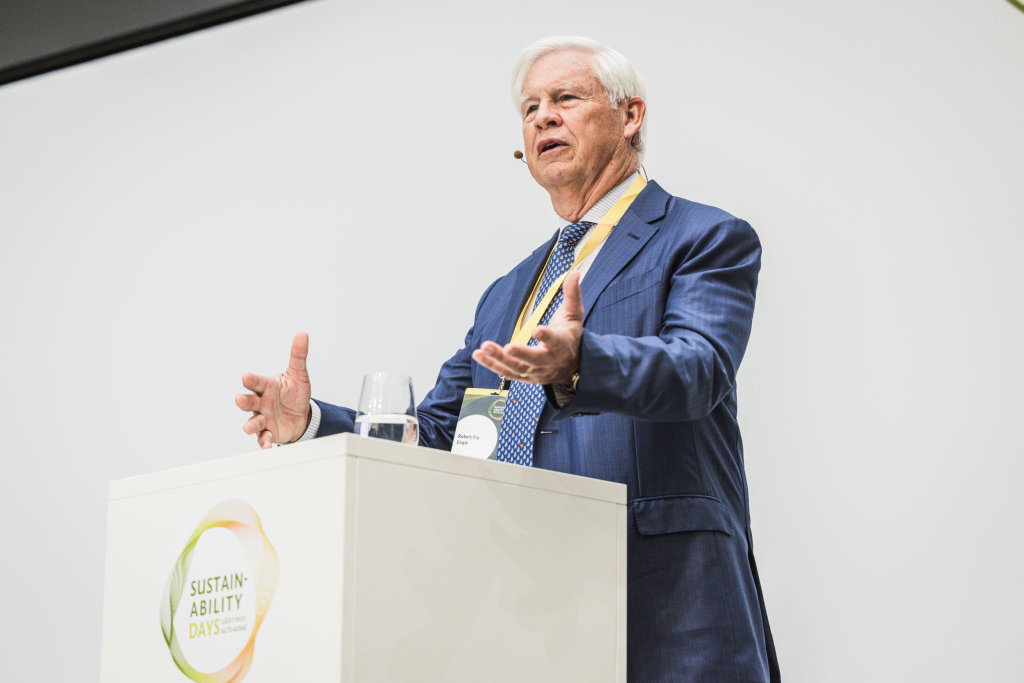
Every nation has different ways to address the impacts of climate change. We are experiencing an externality problem: there is a difference between those who cause emissions and those who bear the costs. Engle emphasizes that the issue must be to price CO2 emissions or reduce them somehow. Various models such as the DICE Model, the Model IAM or the Top Down Model try to evaluate the costs of adaptation measures. In the U.S., the question is what private parties can do to mitigate climate change. Investors and consumers can pressure the government by choosing greener products and selecting employers according to their sustainability stance. Climate Hedge Portfolios offer investors the opportunity to invest in companies addressing climate change. A selection of these hedge portfolios is published at Vlab.stern.nyu.edu. But as an investor, you can also ask yourself, does the bank promote sustainable projects, and does it give out green loans? Even if the time is currently tricky for investments in climate-friendly companies, measures in favor of decarbonization must be promoted. The main objectives should be regional economic cycles: Voters demand concrete actions from the government to advance CO2 offsetting and possible mitigation measures for climate change.
Founder of the Jane Goodall Institute and UN Messenger of Peace, Jane Goodall is known worldwide for her pioneering work in exploring the world of wild chimpanzees. To this day, she travels the world and never tires of highlighting the threats posed by the environmental crisis and calling for action to preserve all living things and the planet we all share.
Jane Goodall founded the Jane Goodall Institute, which now operates in 28 countries in Africa. The mission of this global community is to carry on the legacy of the researcher and environmental activist. Jane Goodall realized during her time in the jungle of Tanzania how closely interconnected everything is. The conservation program aims to preserve human and animal habitats.
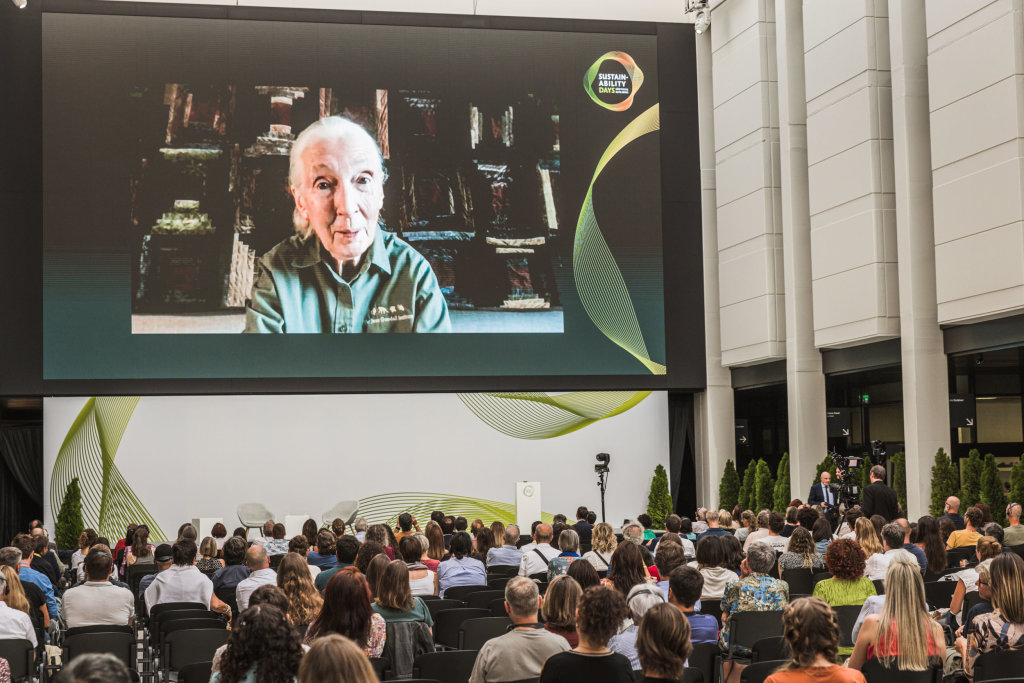
It uses a holistic approach to sensitize local communities to conserve their ecosystems; environmental and animal protection, promotion of girls' education and the granting of micro-credits to local entrepreneurs are all part of it. Jane Goodall is not just about protecting animals but about preserving our future.
In many cases, pollution is a cause of ignorance, but it has a global impact. That one can lose hope in the face of these crises is understandable. Jane Goodall reminds us of the 1980s - even then, students accused older generations of destroying their future. It's not too late. But we need to make a difference to offset climate change - and everyone can make the difference by questioning what they consume daily. Our generation should give more responsibility to young people who care about making the world better. Jane Goodall gives hope: many young people are already taking action, joining together. Faced with environmental problems, people are reawakening; countless scientists are working on alternative technologies. If we are millions, we will create the change. For Jane Goodall, hope is synonymous with action. So let's roll up our sleeves! Head and heart in harmony, compassion and love should determine our actions.
The best moments from day 1
Activist, environmentalist, and co-founder of Extinction Rebellion
Gail Bradbrook
believes that civil, non-violent disobedience can drive needed change. The
Extinction Rebellion movement is doing just that. Launched in the UK in 2018,
it demanded that British politicians tell the truth about the ecological
crisis, declare a state of emergency, and take urgent action to reduce
emissions. This civil disobedience movement sees itself as a form of democracy.
Following earlier greats such as Gandhi and Martin Luther King, it is now
present in 75 countries with over 1,000 groups worldwide.
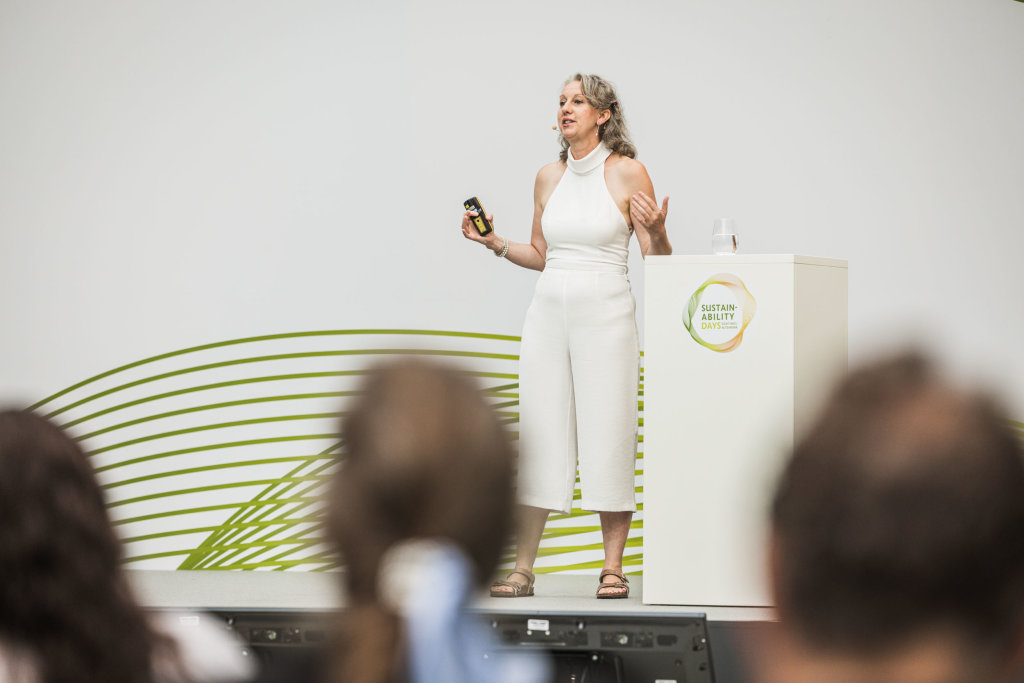
Sometimes civil disobedience actions lead to new ideas and solutions. "No one will save people from the political system they live in. We have to save ourselves," says the activist. These actions aim to resist as much as possible and express your anger at the political systems. But one of the essential foundations is love. Many participants see the act of civil disobedience as a kind of prayer to life, a moment to reflect on why we are here and remember our love for the planet and humanity.
In our society, the focus is constantly on GDP, but the environment must be a priority. Yet, can we really bring about sustainable change in a society that bases its decisions on economic growth? The paradigm of "more and more" must end. The political and economic system that dominates the world must change. We must leave something behind that serves to protect the planet.
Responsible for cities and regions at Doughnut Economics Action Lab
The crises we face today are the causes of a system we inherited that is no longer up to the challenges of the 21st century. Until now, the focus has been on GDP growth - Doughnut economics aims to change the idea of progress by bringing people and the earth into balance.
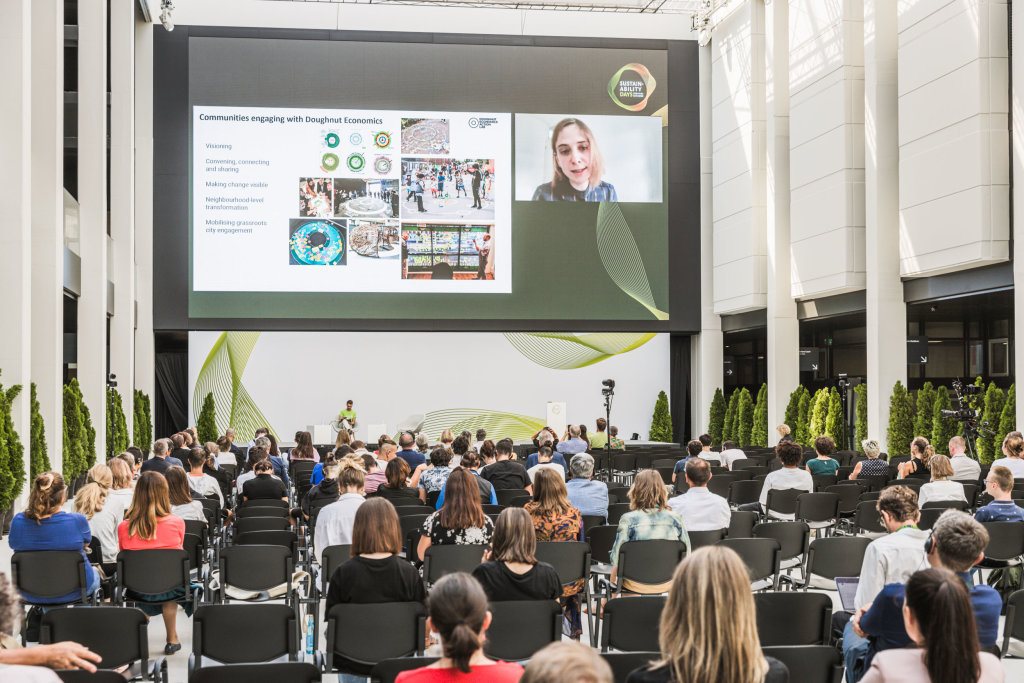
All resources must be fairly distributed and aligned with our needs. Doughnut economics clearly illustrates where the planetary boundaries are and in what area our future is secure. The challenge? We must move from degenerative to regenerative, focusing on recycling and avoidance, circular rather than linear cycles. The goal of Leonora Grcheva's Action Lab, in a growing network of initiators and stakeholders, is to define concrete ways and actions that could change even the smallest habitat. For example, they ask what a city or town can do to protect the planet's health. Another purpose of the Action Lab is to collect data that maps our behavior, measuring our actions and their impact. These insights give us a big-picture view, setting the stage for new policies. Interested people can join this growing network at doughnuteconomics.org.
Sustainability and regenerative leadership expert - founder of Regenerators
Massive species extinction, deforestation, and plastic polluted oceans—we are massively crossing our planetary boundaries; since the 50s, we live in rapid acceleration. So be it in technological development but also in the use of resources. This brings with it an increasing psychological strain on people. In short: all systems are stressed. What can we do about it? By changing our way of thinking. Only when we think one step ahead, differently than we are used to, can we find new solutions. Two thousand years ago, the solar age replaced the lunar period that had prevailed until then. While people lived closely with their environment before, seeing God in everything, we distanced ourselves more and more afterward. Man and nature were no longer close to each other.
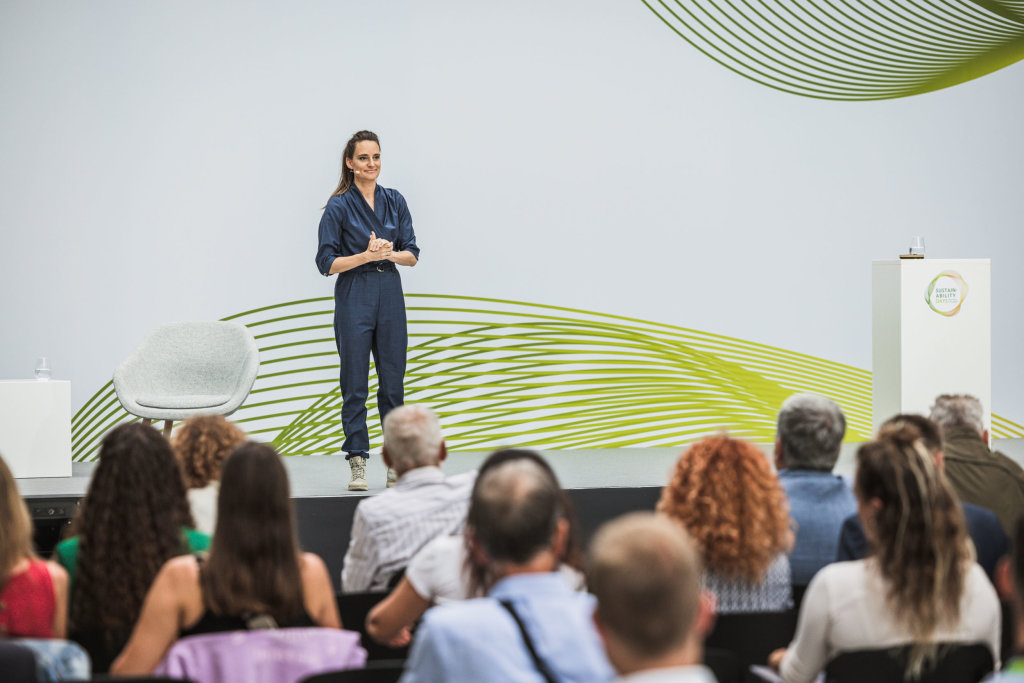
A shift to an extractive view gave rise to the sciences and the Industrial Revolution. With progress, organizations also became hierarchical. At the top, some individuals decide for many. The last years show that resignation, the "inner resignation," is increasing more and more because people can no longer identify with the values of their employer. We need to learn from our evolution and apply this to our business. For Storm, the DNA of regenerative leadership is composed of design, culture and essence. By design, the sustainability expert means, for example, bio-inspired innovations; the culture should be a respectful work environment that promotes networking instead of competitive thinking. Storm sees the essence of regenerative leadership in sharpening one's perception. Ultimately, each of us can be a leader by becoming aware of what we want to do. This is because the quality of the inner ecosystem also influences the outer ecosystem. We should find a new lifestyle and rediscover ourselves as cyclical living beings.
The founder of the non-profit youth organization Force of Nature wants her organization to mobilize mindsets and mentalities and shows how every young person can make a difference.
Phenomena such as greenwashing, woke-washing and use-washing disillusion young people. At the same time, people between the ages of 18 and 25 are increasingly choosing employment based on ethical principles; they feel more comfortable if they are allowed to work for companies that operate sustainably. But what prevents them from taking concrete action? According to Hogan, it's these three factors: first, the human psyche, which tends to be slower to respond to threats, the more insidious they are.
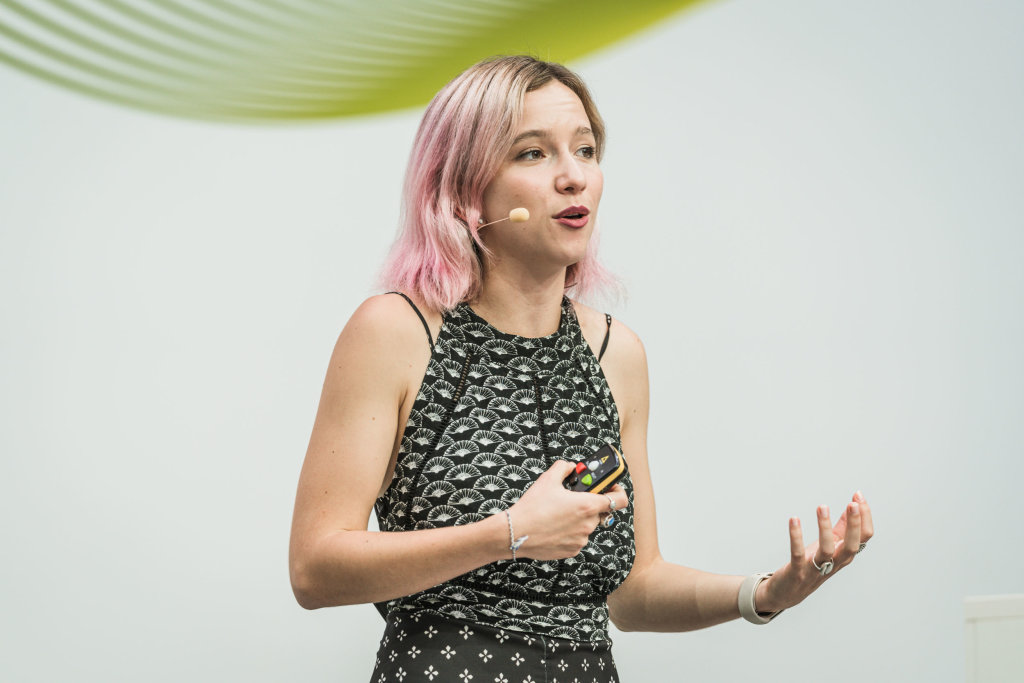
Second, they are influenced by the cultural narrative that is driven by a privileged society; it makes them more consumerist and, to some extent, self-centered. Third, the so-called self-limiting stories make people believe they can't do anything on their own.
To get out of this cycle of powerlessness, Hogan first recommends that everyone question their own narrative that blocks and limits them. Everyone has a narrative that can be rewritten to take action. According to the SEAD theory, everyone can develop their own Story, formulate Expectations, determine Actions, and make Decisions.
Hogan emphasizes that eco-anxiety is an entirely rational human reaction and appeals, "Who but ourselves should act now, instead of letting fear paralyze us."
The best moments from day 2
Activist, coordinator of Fridays for Future Brescia and former spokesperson of Fridays for Future Italy. He joined the NGO 'Save the Planet' to measure, collaborate and communicate with people, companies and politics to improve efficiency and climate solutions in large projects.
Why aren't we addressing the climate crisis? According to Mori, there is a lack of political will. The drastic climate change we are experiencing is something humanity has never faced before. It is a situation that the youth of today will have to deal with tomorrow, and their lives will be very different from those of their parents. We already know the solutions that can apply. Some examples? Promoting renewable energy, changing food production and consumption, and promoting education worldwide. But why are we not acting fast enough to deal with the current crisis? We have known about these risks for decades.
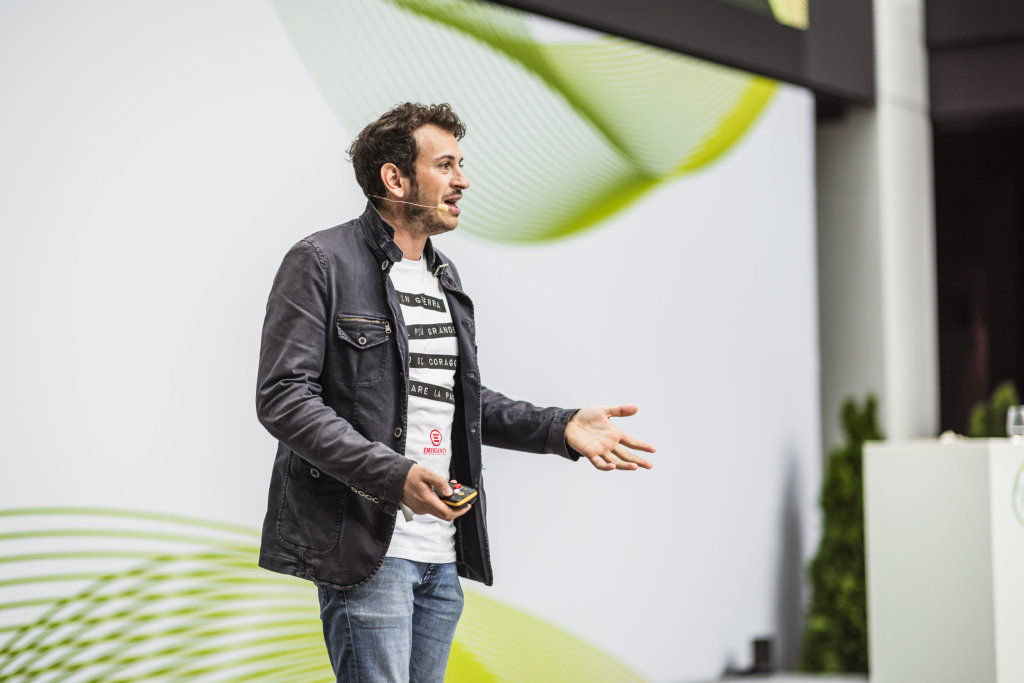
We, as consumers, are being blamed for the crisis. An example of this was the introduction of the carbon footprint indicator, which is based on individuals and not big industry. We are asked to think about our small actions. Of course, we can all do our part with our personal choices. Nevertheless, actions of a different magnitude would be much more important but are also much more inconvenient.
What influence can we have by electing our political representatives? How can we reduce CO2 emissions by protesting in the streets for climate justice? How important is it to stay informed? Mori affirms: All of this is useful and necessary. However, nations need to make new concessions when millions of people take to the streets. That's why young people and their involvement are critical for a more sustainable world.
Youth climate justice activist from London whose work focuses on regenerative cultures, intersectionality, radical social justice, and youth political engagement.
Resilience is the term that represents Generation Z, a generation that has yet to figure out how to become stronger. A generation is relying on new communication channels, facing global crises and resistance. Daze Aghaji's mission as an activist began when she decided to get involved after attending a meeting that changed her life. Today, she is guided in her actions by the question, "What can I do to improve the protection of our country?" She is convinced that we must face the truth - and she is fortunate to be able to do this together with others. Today, she wants to be a role model for young people, asking them to recognize how unjust our world is. We must understand that the meaning of our lives is to improve the conditions for future generations.
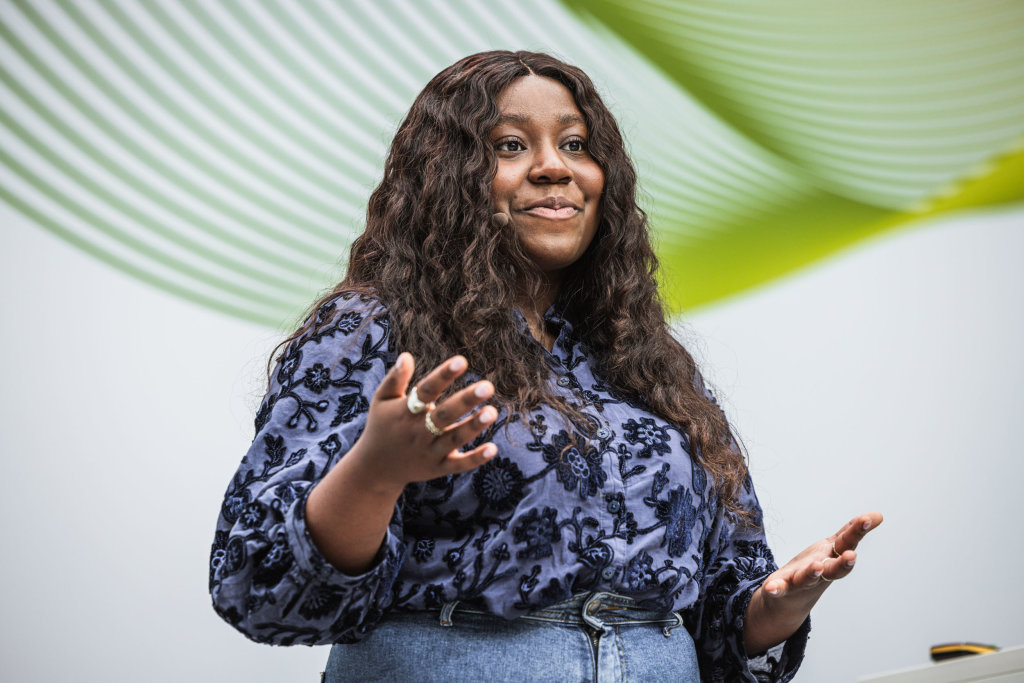
The path of young people must be one of awareness and action. Protest is the best way to give voice to all. Adults must facilitate places of exchange and community for the young generation.
In conclusion, Daze Aghaji asks the audience's young listeners, " What do you need to take action?" The answer follows on the spot, "Support, motivation, time, community!"
UN expert for harmony with nature and researcher on the "Rights of Nature" from South Tyrol.
For Alex Putzer, the right of nature is the new way to protect the environment. It is a human right to have a healthy and livable environment. It is necessary to stand up for this. Nature must be seen and perceived as something that has value, even if it does not produce any benefit or generate energy.
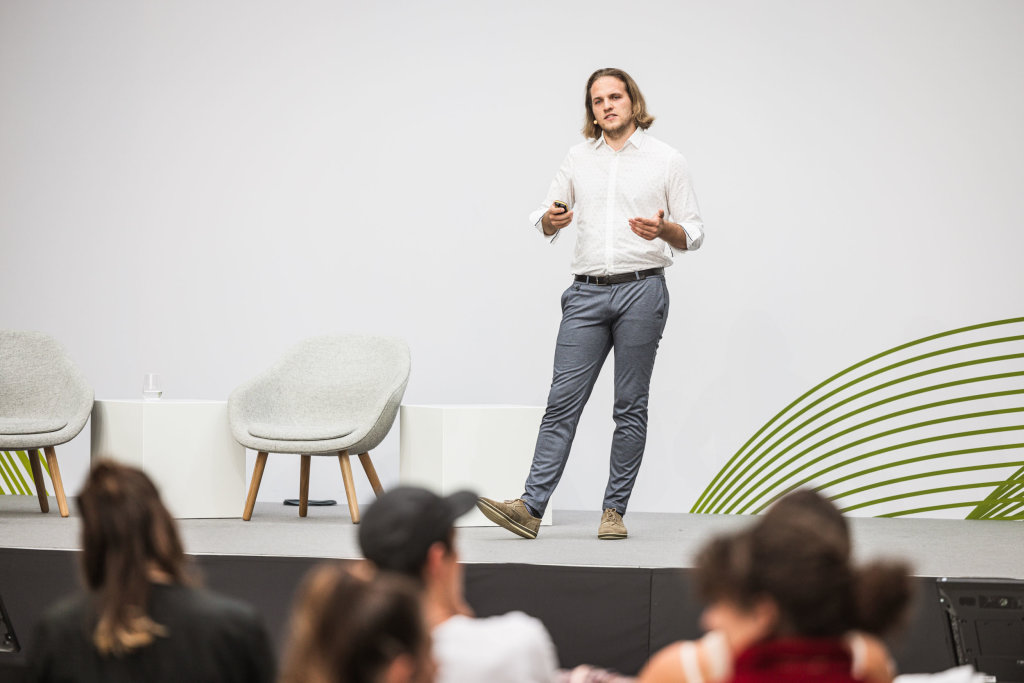
Nature has a right to exist in its entirety and particularity. Not only humans have a right to these ethical considerations, but also the elements of nature, ecosystems and animals.
The rights of nature do not focus on humans and are especially present in rural areas. There are more than 40 such initiatives worldwide. Putzer names a few of them: In Ecuador, nature has been considered an element with its legal personality since 2008. In 2017, the Maori in New Zealand recognized their most important river as a subject with legal rights. The Mar Menor in Spain is the first ecosystem with a legal identify.
The most well-known initiatives related to the rights of nature come from South America and New Zealand, but Europe has also begun to address this concept. Italy has great potential in this regard, and according to surveys, the population seems inclined to recognize the rights of nature. But how can we promote the rights of nature in South Tyrol and other rural areas? To do this, we first need to understand what natural rights are and what types of nature they include, whether individual animals, places, or entire ecosystems. Finally, we need to raise awareness and make the best use of existing structures.
The American journalist and author of the New York Magazine bestseller "The Uninhabitable Earth" is known for his statements on climate change. In his live appearance at the Sustainability Days, Wallace reveals that global warming is increasing rapidly. In the last 25 years, we have damaged our earth many times over. Despite all the progress and technological innovations, we have not yet taken the necessary steps to even remotely meet the Paris climate goals. Wallace sees meeting the 1.5-degree limit as unachievable. This summer has given us a stark reminder of how global warming is affecting the climate. Extreme heat waves in China and America and floods in Pakistan led to numerous evacuations and human suffering. Projections estimate 200 million climate refugees in the coming years. For Wallace, one thing is clear: "In the wake of climate change, we shouldn't just be talking about decarbonization. It's about not just refraining from but actually choosing to do certain things, such as finding new forms of agriculture, managing our water resources differently, and rethinking urban planning. Decarbonization and adaptation are the actions we can take to counter the effects of climate change."
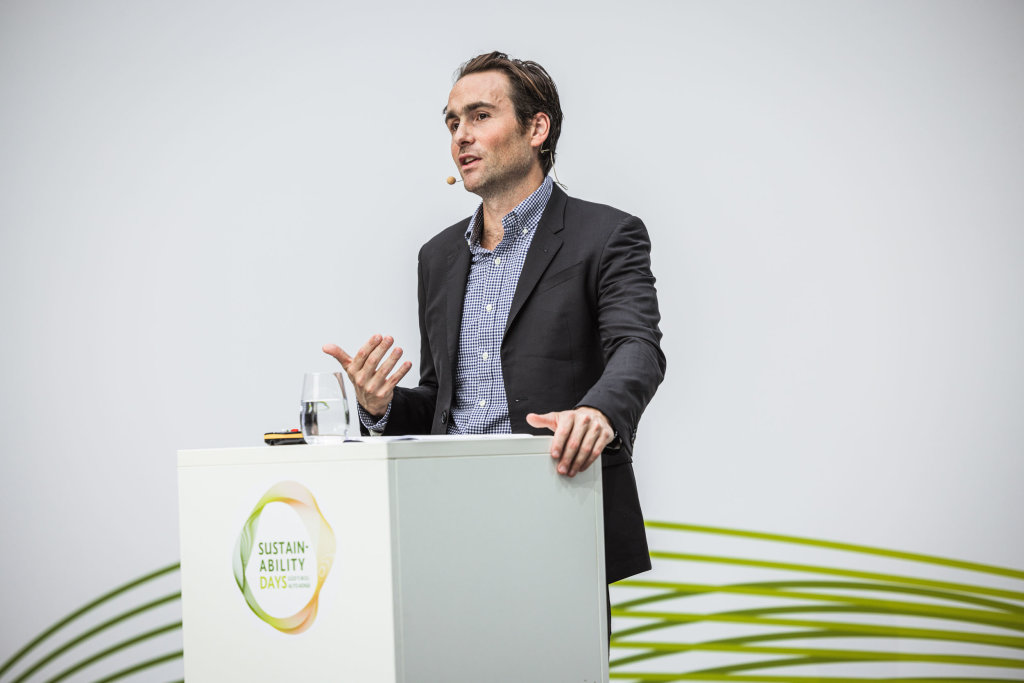
The best moments from day 3
Scientist, Chairwoman of the Board of the AI Park in Berlin and former Deutsche Bahn Board Member for Digitalization and Technology.
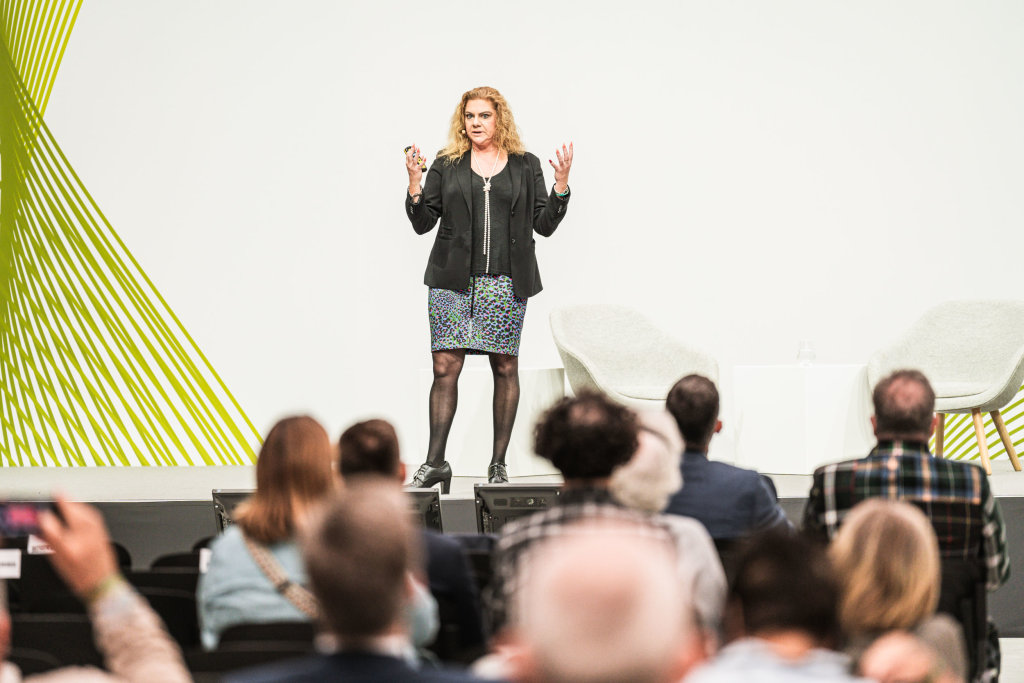
Five major developments are occupying our world: the fourth industrial revolution, the Covid-19 pandemic, demographic changes, the climate crisis and the end of peace in Europe. New directions in artificial intelligence (AI) are emerging from the interplay of these trends. As a demographic change in Europe is already drawing a significant decline in skilled workers, automation can provide alternative solutions to transportation or mobility and can also serve to protect the environment. For instance, self-driving trucks will reduce fuel consumption.
The fourth industrial revolution is already using AI. This is relevant in production, and areas that require intellectual activities can also use it. While the second industrial revolution focused primarily on metropolitan areas, the fourth revolution reversed the trend. For example, startups increasingly prefer rural areas because they find good framework conditions.
The Covid-19 pandemic has proven that remote working can work, partially thanks to digitization. While Zoom meetings were the exception, they are now a mass phenomenon. In addition, different communication tools have been optimized and continue to spread, providing doctors and truck drivers with new technologies. Regarding sustainability, Remote Working also reduces mobility: peak times due to commutes can be balanced out as a result.
What can AI do in the future? Quantum computing (QC) is becoming increasingly tangible. These supercomputers are making previously unattainable goals more realistic. Simulations and analyses can be created and calculated more quickly. This is also in the interests of sustainability. For example, QC can simulate how solar cells in space are used as power plants for the Earth or how we reduce the climate-damaging contrails in air traffic.
When can we expect AI? The Baltic states and Scandinavia are already very advanced in this area. "The fact that it's taking so long here is not a technical problem but a political one," Jeschke admits at the end of her presentation.
Environmental transitions must be a priority for policymakers. Delaying action imposes economic, social and environmental costs and increases physical risks for all stakeholders. The sustainability challenge must be addressed now through positive and visionary policies that translate into concrete actions.
The experts who participated in the Sustainability Days have written a summary document. This consists of concrete proposals directed to the politicians for the four areas of interest identified in the first edition of the event:
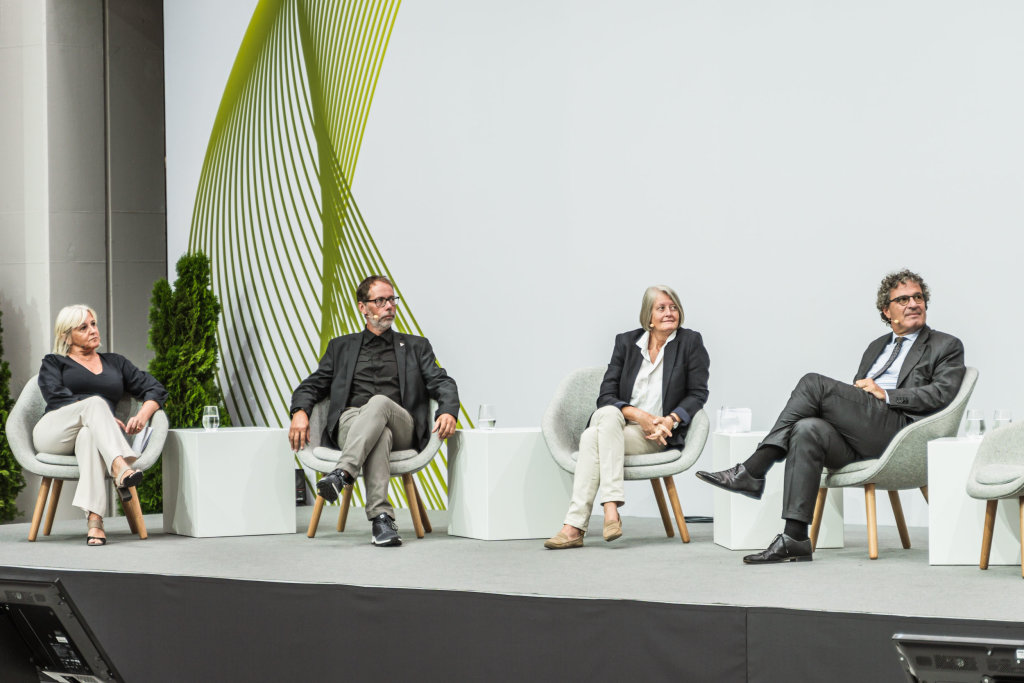
Agriculture and food: the production and consumption of food must take into account the protection of ecosystems.
Recommendations: raise awareness of biodiversity and improve the effectiveness of policies; take action to regenerate ecosystems; support research in food production; and promote sustainable diets.
Renewable energy and energy efficiency: this sector is still far too dependent on fossil fuels, which threaten the environment, the economy and society. We already have the technologies needed to manage the energy transition, but the process is complex at the societal level.
Recommendations: reduce energy demand; establish climate-friendly energy systems; create more space for renewable energy; improve energy storage and energy networks; create synergies between existing projects; complete projects that have been started; and promote the participation of women and young people.
Sustainable mobility and tourism: many projects exist, but are we sure they will work? They have different applicability depending on space and time, and what works well in the urban environments of big cities, for example, does not work as well in rural areas.
Recommendations: revise the regulatory framework that prevents or slows change; create synergies to cross-fertilize services; aggregate demand; and engage policymakers who are leaders in their rural regions.
Resilient regional habitats: resilience as a continuous process can be an important driver for the development of rural regions.
Recommendations: identify and conserve natural resources specific to each area; improve local income through job creation; revitalize economic potential; enhance identity and self-confidence; and promote community systems and social networks.
The best moments from day 4